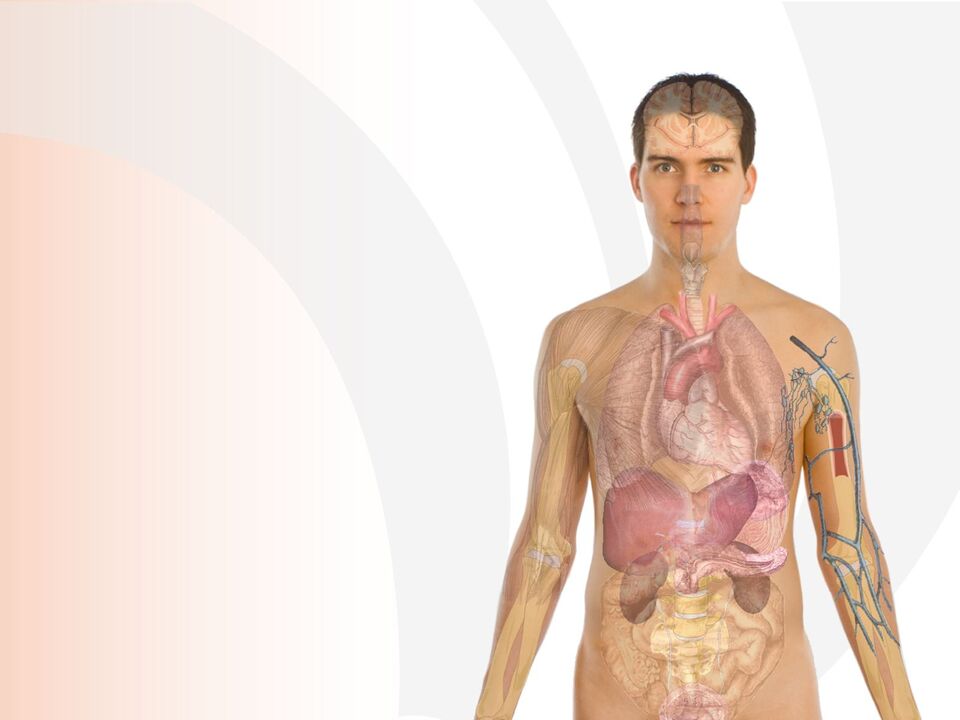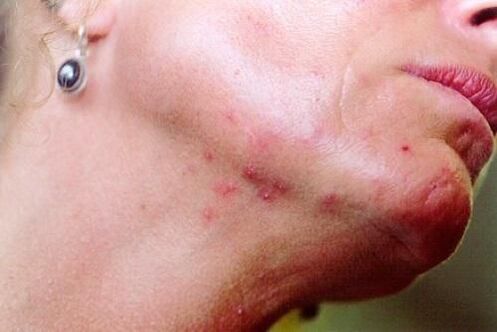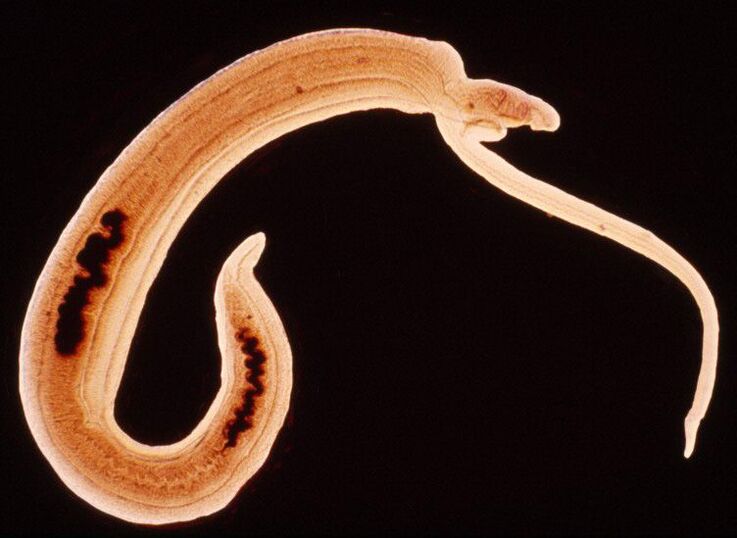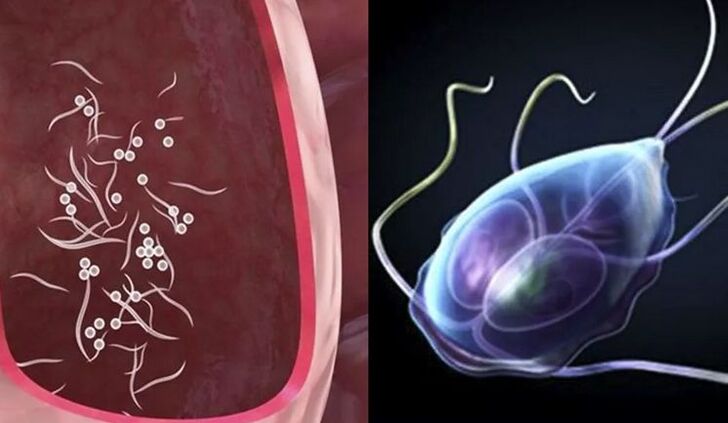Symptoms of a worm infection are different. For example, digestive disorders often develop - nausea, vomiting, pain and bloating in the abdomen. Some patients don't notice the signs until they develop a rash that cannot be eliminated with conventional medications. Often, the infestation of helminths is accompanied by symptoms similar to other diseases and allergies. Therefore, a timely diagnosis is required.

Worm infections in humans
Most helminths are spread into the human body by eating unwashed fruits and vegetables. After spreading throughout the body, it will damage organs, causing dangerous diseases. Diseases of the liver, kidneys, heart, gastrointestinal tract, gallbladder, and even oncology can develop.
A common characteristic symptom is skin irritation, rash. But a person may not notice this for many years, while the pathology develops, although a single course of deworming medication is enough for a full recovery.
Method of infection
There are 4 ways by which worms spread into the human body:
- Geohelminthiasis. The parasite enters through soil left on unwashed fruits and vegetables and spreads into the water. In addition, infection is possible if hands are not washed thoroughly after working with the ground. Ground contact is often observed of animals entering homes with dirty paws. Eggs, larvae, and adults can enter the human body.
- Contact. In the host body, the female lays 4-5 thousand eggs in 1 day. They can spread from an infected person to another person after contact, especially in the home. Eggs or adults are spread through bedding, towels, and toiletries. It is not enough for infected people to wash their hands. Usually, this pathway is characteristic of pinworms and filariasis.
- Biohelminthiases. Parasites are stored in the bodies of living and dead animals, fish. Then a person can eat them. Parasitic preservation is observed by insufficient heat treatment.
- Con center apartment. In this way, the smallest sized helminth eggs will be transmitted.
Of all the forms of helminths, infection most commonly occurs when eggs and larvae are ingested. They can be found in soil, water, on sick people, in raw meat. It is important not only to wash food and hands, but also to always heat food.

Symptoms of helminthiasis
Symptoms of infection vary depending on the stage of the disease.Usually, the following symptoms appear:
- weight loss, emaciation;
- paleness of the skin;
- itching in the anus.
The symptoms are the same as other diseases, so the patient can use the wrong treatment methods. Symptoms can vary depending on the area of the body affected. For example, with liver damage, the skin turns yellow.
Digestive dysfunction
With the entry of pathogens into the gastrointestinal tract, the following symptoms develop:
- violation of the formation of fecal masses (constipation, diarrhea);
- itching in the anus;
- digestive disorders - nausea, vomiting, abdominal pain, heartburn;
- abdominal pain in the intestines;
- flatulence, accompanied by swelling;
- the periodic change of body weight from a greater extent to a lesser extent.
In the early stages, symptoms are barely visible. The more the worm damages the internal organs, the more actively the signs develop. Some parasites have the ability to secrete waste products that are foreign to the body. This leads to severe poisoning and diarrhea. Large worms spread throughout the intestines, preventing the passage of stool. This causes constipation.
Due to the expulsion of worms, a person becomes severely intoxicated. That is why asthenia, irritability, digestive disorders develop.
Immunosuppressive
When a person consumes food, nutrients enter the body and are distributed throughout the tissues.Worms eat them, so the patient develops the following deviations:
- anemia;
- metabolic disease;
- suppress the immune system.
A person usually begins to get sick from diseases caused by viruses, bacteria, fungi. Even with the use of multivitamin preparations, the vitamin deficiency will not be eliminated until deworming treatment is complete.
Nervous disorders
Some helminths are capable of damaging peripheral tissues of the nervous system, crossing the blood-brain barrier. These properties are possessed by the products of their intoxication.Nervous system damage causes the following symptoms:
- persistent forgetfulness, poor memory;
- headache to migraine;
- dizzy;
- stress, nervous disorders, depression;
- increased fatigue.
Patient behavior changes. He conflicts with those around him, forgetting his acquaintances. Gradually, the symptoms were added, the body temperature increased by more than 39 degrees.

Chronic anemia leads to chronic fatigue syndrome. Gradually, the number of red blood cells decreases, causing anemia. The person becomes irritable and aggressive.
Respiratory disorder
Even in the early stages, lesions in the deepest parts of the respiratory tract can develop.The following pathologies develop:
- tracheitis, bronchitis;
- emphysema, bronchial asthma, pneumonia.
Signs of a worm infestation can even be rhinitis, frequent sore throats.
Skin problems
For the normal development of the epidermis, a sufficient amount of vitamins, trace elements and minerals is required. Invasion of worms leads to anemia, as a result of which the quality of the skin is affected.The following deviations appear:
- acne, acne, rash;
- itching, peeling, redness of the epidermis;
- nail peeling.
Even the most serious skin pathologies can develop:
- urticaria, dermatitis;
- papillomas, increased sebum secretion;
- allergy.
Doctors and patients may not immediately understand why medications don't help treat these conditions. Skin quality is noticeably reduced, becomes pale, wrinkles appear. Turgor decreases, ie, surface tension.

Signs of infection depend on the type of worm
The severity of symptoms depends on the following factors:
- the number of parasites in the body;
- the level of immune activity;
- localization of the parasite;
- type of parasite.
Some helminths can stay in the host for a long time without causing negative symptoms. Other individuals are likely to have an immediate deterioration in health, damaging the liver. For example, roundworms.
Roundworm
Roundworms damage many internal organs, causing certain symptoms, similar to other diseases.The following symptoms may be present:
- increased body temperature;
- persistent cough;
- severe fatigue;
- bronchitis, pneumonia.
First, the gastrointestinal tract is damaged, as a result, vitamin deficiencies and metabolic disorders are formed. The human body is exhausted. Gradually forming signs of gastrointestinal damage:
- jaundice;
- bowel obstruction.
With the spread of worms through the blood-brain barrier, severe headaches, migraines and depressive states appear.
Schistosomiasis, gnathostomiasis, gnathostomiasis, toxocariasis
The parasite causes the following deviations:
- lack of nutrients and vitamins;
- decreased metabolism, causing a change in body weight;
- intestinal dysbiosis.
Gradually, the anemia will turn into beriberi, leading to significant physical exhaustion. A person's skin becomes pale, he may pass out often, this is a typical for anemia.
Pinworm
Pinworms are characterized by the deposition of eggs in the anus, usually at night. So a person is worried about intense itching in the anus. The disease is characterized by periodic remission, so the itching is sometimes gone. Without treatment, the invasion of helminths is more and more widespread, making the patient anxious and itchy at any time of the day.
Trichinosis
The parasite invades any part of the body, producing a large amount of poison. This leads to constant spasms, cramps, muscle pain. Due to damage to the cardiovascular system, edema forms. During severe intoxication, body temperature rises.
Small liver fluke disease, small liver fluke disease, small liver fluke disease
This is one of the dangerous helminths, which leads to the following lesions:
- difficulties in the liver with the development of jaundice;
- intestinal obstruction, digestive disorders when spread by the gastrointestinal tract.
Gradually the patient developed hepatosplenomegaly.
Genitourinary schistosomiasis

The parasite is actively spread through the genital system. Due to the chronic inflammatory process damage the mucosa. So, when urinating, a person detects red urine, indicating the development of foci of bleeding.
The habitat of worms
In the human body, helminths can damage the following types of organs:
- vlasoglav - large intestine;
- roundworm, tapeworm, hookworm - small intestine;
- roundworm - liver.
Depending on the damaged organs, different symptoms are formed:
- liver - jaundice, right hypogastric pain, hepatitis;
- respiratory tract - trachea, bronchitis, pneumonia;
- brain - convulsions, paresthesia, fainting.
It is necessary to simultaneously treat diseases (hepatitis, colitis), eliminate helminths.

Common worms
Scientists count a large number of parasites found in the human body. In total there are more than 100 of them.But more commonly, doctors distinguish an infection from the following types of parasites:
- pinworm;
- dwarf tapeworm;
- tapeworm;
- hookworms;
- flagellate;
- paragonimiasis;
- large liver fluke disease.
In order to correctly determine the type of pathogen and prescribe the appropriate treatment, it is necessary to carry out laboratory and instrumental diagnostics. First, the patient is examined by a specialist, then faeces are given to make isomers, detecting worm eggs. Usually, therapists and infectious disease specialists recommend doing a double study, because even if an infection is present, eggs and larvae may not be detected.
Laboratory blood testing is recommended for patients at risk of:
- the presence of pets;
- work related to animals;
- medical staff;
- employees of children's educational institutions;
- food workers.
Attention! For the precise identification of helminths and its toxic products, an enzyme-linked immunosorbent assay should be performed. It is carried out in city clinics and hospitals, as well as in private laboratories.
Therapeutic Methods
Drugs against helminths should not be independently selected, since they strongly affect the state of the liver and kidneys. It is recommended to undergo an initial examination, after which specific drugs are prescribed. Dosage is selected depending on the health condition, age, body weight of a person.
The following drug management methods are selected:
- tablets - mild or moderate degree of helminthiasis;
- injection, infusion - a severe degree of the disease, the formation of an excessive number of parasites, severe damage to the gastrointestinal tract.
Many drugs can only affect adults. If there is a risk of eggs and larvae, it is better to undergo a second course of treatment or choose a more effective remedy.
The table shows the optimal drugs for treatment.
| Matter | Affect |
| mebendazole | Completely kill pinworms, hookworms, whipworms, tapeworms and other parasites |
| Pyrantela pamoate | This substance has the effect of killing roundworms, effective in helminthic diseases and necrosis |
| Levamisole hydrochloride | Kill roundworms and hookworms |
| Embossed Pirvinia | Helps to completely cure intestinal worm disease |
| Albendazole | It helps to kill most elements at the adult or larval stage. |
Initially, the pathogen should be accurately identified, and then the drug should be applied. This will increase the chances of recovery without adversely affecting the body.
Methods of prevention
To prevent the entry of parasites into the body, use the rules of prevention:
- wash hands after coming home, during the day, after contact with animals;
- the use of only one person's toiletries, dishes;
- take multivitamins, give up bad habits to strengthen the immune system;
- Thorough washing of fruits and vegetables, heat treatment of meat and fish;
- the use of high quality drinking water from proven sources.

Many helminths can be found in many products, so the risk of infection cannot be ruled out. Anyone can get a parasitic infection without even knowing it. It can spread from one family member to others through household contact. Therefore, it is necessary to use daily precautions.
It is important to take good care of the animals. It is necessary to bathe periodically, give medicines from parasites to reduce the risk of helminth infections.
If a person suspects he has a helminth infection, it is better to go for a laboratory test in a timely manner. It is repeated twice to avoid false negative test. Self-administration of the drug is prohibited. All of them have strong effects, adversely affecting the liver. Only a doctor can choose the optimal dewormer with the right dosage. With timely treatment, it is possible to prevent the development of serious diseases, immunodeficiency.























